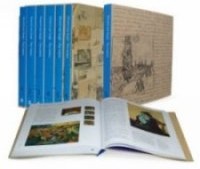

The Letters
What better way to learn the innermost thoughts and feelings about Van Gogh than in his own words? His letters to his brother, Theo, make for extremely poignant, and often incredibly heartbreaking reading. Often, you can hear the man in the words (just, as I mention elsewhere, you can see the man in the paintings)--lonely, unhappy, poverty-stricken, sick, completely despairing. And yet, here, too, do we find the man who writes:
In my opinion, I am often rich as Croesus--not in money, but (though it doesn't happen every day) rich--because I have found in my work something which I can devote myself to heart and soul, and which inspires me and gives a meaning to life.
Of course my moods change, but the average is serenity. I have a firm faith in art, a firm confidence in its being a powerful stream which carries a man to a harbor, though he himself must do his bit too; at all events, I think it such a great blessing when a man has found his work that I cannot count myself among the unfortunate. I mean, I may be in certain relatively great difficulties, and there may be gloomy days in my life, but I shouldn't like to be counted among the unfortunate, nor would it be correct if I were.
(from Letter 274 to Theo from the Hague, 11 March 1883)

- One of the most important art references to be released in the last fifty years Vincent van Gogh: The Letters (Thames & Hudson, 2009) is a revelation. Research staff at the Van Gogh Museum and the Huygens Institute in The Hague worked tirelessly for fifteen years to produce this extraordinary six-volume set. All 902 of the complete letters are presented with new translations, new transcriptions and include exhaustive annotations that shed new light on the vast compilation of Vincent van Gogh's correspondence. Upon its release these volumes received world-wide media attention. John Banville of The Observer in the U.K. wrote "This magnificent new edition of the complete Van Gogh letters is a celebration not only of a great artist but of art itself." Martin Bailey in The Art Newspaper calls the new edition "a distinguished scholarly achievement"--one which "transforms our understanding of the artist." With more than 2,500 pages and 9,000 colour illustrations Vincent van Gogh: The Letters is, without question, now the gold standard for the complete Van Gogh letters. Highly recommended. Edited by Leo Jansen, Hans Luijten and Nienke Bakker.

- The Complete Letters of Vincent Van Gogh (Bullfinch Press, 2000). Until the publication of the definitive six-volume set of letters (above), this three-volume set was always the most comprehensive reference for Van Gogh's letters. For years, however, it was extremely difficult to find because it was out of print. In early 2000 this extraordinary set has been republished and that's wonderful news for anyone interested in Vincent van Gogh's life. Vincent's letters offer incredible insights into the man and his work. Dr. Jan Hulsker once wrote: "[His letters] enable us to know more about Van Gogh's life and mentality than we do of any other artist. The letters form a running commentary on his work, and a human document without parallel."
- The Letters of Vincent van Gogh, selected and edited by Ronald de Leeuw (The Penguin Press, 1996): Although heavily edited, this is the next best thing to the three volume set. This edition is an excellent reference source in that it gives precise dates and letter numbers throughout. An extremely valuable book for anyone interested in Van Gogh.
- Brief Happiness: The Correspondence of Theo Van Gogh and Jo Bonger, edited by Leo Jansen and Jan Robert (Waanders, 2000): In this volume the 101 existing letters between Vincent's brother, Theo van Gogh, and Theo's fiance, Johanna Bonger, are published for the first time in their entirity.
Through the letters the reader gains insights into a young Dutch couple in love in the late 19th century. The book not only presents intriguing and very personal insights about Vincent van Gogh, but is also a compelling and touching chronicle of two young people as they prepare for marriage and a life together. A life tragically brief, as the title suggests.
Much has been written about Vincent van Gogh, of course, but it's fascinating to read insights about how his own family and contemporaries perceived him. For example Theo wrote: "He is one of the most advanced painters and it is difficult to understand him, even for me who knows him so intimately. His ideas cover so much ground, examining what is humane and how one should look at the world, that one must first free oneself from anything remotely linked to convention to understand what he was trying to say, but I am sure he will be understood later on. It is just hard to say when."
A satisfying and very worthwhile exploration of three lives--forever interwoven.
- Dear Theo: The Autobiography of Vincent Van Gogh, edited by Irving Stone (Plume, 1995): While I would more highly recommend the De Leeuw edition mentioned above, this book is also a fine look at Van Gogh's letters to Theo.
 Return to Van Gogh Books page
Return to Van Gogh Books page
 Return to main Van Gogh Gallery page
Return to main Van Gogh Gallery page




 Return to Van Gogh Books page
Return to Van Gogh Books page Return to main Van Gogh Gallery page
Return to main Van Gogh Gallery page